
Within Our Gates is a 1920 American silent film by the director Oscar Micheaux that portrays the contemporary racial situation in the United States during the early twentieth century, the years of Jim Crow, the revival of the Ku Klux Klan, the Great Migration of blacks to cities of the North and Midwest, and the emergence of the "New Negro". It was part of a genre called race films.

Blossoms in the Dust is a 1941 American biographical film directed by Mervyn LeRoy and starring Greer Garson, Walter Pidgeon, Felix Bressart, Marsha Hunt, Fay Holden and Samuel S. Hinds. It tells the true story of Edna Gladney, who helped orphaned children find homes and began a campaign to remove the word "illegitimate" from Texas birth certificates, despite the opposition of "good" citizens. The screenplay was by Anita Loos, with a story by Ralph Wheelwright.

The Devil's Holiday is a 1930 American Pre-Code film starring Nancy Carroll, Phillips Holmes, ZaSu Pitts, James Kirkwood, Sr., Hobart Bosworth, and Ned Sparks, and released by Paramount Pictures.

Oscar Devereaux Micheaux was an author, film director and independent producer of more than 44 films. Although the short-lived Lincoln Motion Picture Company was the first movie company owned and controlled by black filmmakers, Micheaux is regarded as the first major African-American feature filmmaker, a prominent producer of race films, and has been described as "the most successful African-American filmmaker of the first half of the 20th century". He produced both silent films and sound films.
Stirling Dale Silliphant was an American screenwriter and producer. He is best remembered for his screenplay for In the Heat of the Night, for which he won an Academy Award in 1967, and for creating the television series Naked City, Perry Mason, and Route 66. Other features as screenwriter include the Irwin Allen productions The Towering Inferno and The Poseidon Adventure.
AFI's 100 Years...100 Stars is the American Film Institute's list ranking the top 25 female and 25 male greatest screen legends of American film history and is the second list of the AFI 100 Years... series.

Evelyn Preer, was a pioneering American stage and screen actress and jazz and blues singer of the 1910s through the early 1930s. Preer was known within the black community as "The First Lady of the Screen."

The Exile is a 1931 American film directed by Oscar Micheaux with choreography by Leonard Harper. A drama-romance of the race film genre, The Exile was Micheaux's first feature-length sound film, and the first African-American sound film. Adapted from Micheaux's first novel The Conquest (1913), it the film shares some autobiographical elements; for example, Micheaux spent several years as a cattle rancher in an otherwise all-white area of South Dakota as does the film's central character Jean Baptiste.

The race film or race movie was a genre of film produced in the United States between about 1915 and the early 1950s, consisting of films produced for black audiences, and featuring black casts. Approximately five hundred race films were produced. Of these, fewer than one hundred remain. Because race films were produced outside the Hollywood studio system, they were largely forgotten by mainstream film historians until they resurfaced in the 1980s on the BET cable network. In their day, race films were very popular among African-American theatergoers. Their influence continues to be felt in cinema and television marketed to African Americans.

Lawrence Chenault was an American vaudeville performer and silent film actor. He appeared in approximately 24 films between years 1920 and 1934; most of his performances were in films directed by pioneering African-American filmmaker Oscar Micheaux. His brother, Jack Chenault, was also a film actor.

Little Caesar is a 1931 American pre-Code crime film distributed by Warner Brothers, directed by Mervyn LeRoy, and starring Edward G. Robinson, Glenda Farrell, and Douglas Fairbanks Jr. The film tells the story of a hoodlum who ascends the ranks of organized crime until he reaches its upper echelons. The storyline was adapted from the novel of the same name by William R. Burnett. Little Caesar was Robinson's breakthrough role and immediately made him a major film star. The film is often listed as one of the first fully-fledged gangster films and continues to be well received by critics.

The Brute is a 1920 silent race film directed, written, produced and distributed by Oscar Micheaux. No print of the film is known to exist and the production is believed to be a lost film. The original version of the film included a scene where the boxer defeats a white rival, but Micheaux was forced to remove the scene by censors.

Cradle Snatchers is a 1927 American silent comedy film directed by Howard Hawks. The picture is based on the 1925 Russell Medcraft and Norma Mitchell stage play of the same name that starred Mary Boland, Edna May Oliver, Raymond Hackett, Gene Raymond and Humphrey Bogart. An incomplete copy, missing part of reel 3 and all of reel 4, exists in the Library of Congress.

Norman Studios, also known as Norman Film Manufacturing Company is a former American film studio in Jacksonville, Florida. Founded by Richard Edward Norman, the studio produced silent films featuring African-American casts from 1919 to 1928. The only surviving studio from the period of early filmmaking in Jacksonville, its facilities are now the Norman Studios Silent Film Museum.
Birthright is a 1939 American film directed, co-produced and co-written by Oscar Micheaux. Carman Newsome stars in the 1939 film as a black Harvard graduate facing racism and discrimination after he returns to his small hometown in Tennessee, where he hoped to develop a school similar to Tuskegee Institute or Hampton Institute, both historically black colleges.
Ethel Moses was an American actress and dancer, billed as "the black Jean Harlow". She is best known for working in films by Oscar Micheaux.
The Broken Violin is an American silent film directed by Oscar Micheaux, released in 1928.
Brown Gravy is a 1929 American comedy film with an African American cast. William Watson directed the Al Christie production. It was among the early "talkie" films released with African American casts. Octavus Roy Cohen wrote the story, part of a series he wrote for the Saturday Evening Post adapted to film in collaborstion with Christie. The film's thin plot includes themes addressing religion, fraternal organizations, con men, and family life.
The Frederick Douglass Film Company was an early American film production company in Jersey City, New Jersey. It was established in 1916, soon after the pioneering Lincoln Motion Picture Company, by prominent African-American business and professional men from New Jersey. The intent of the founders was to counter anti-African-American films such as The Birth of a Nation (1915) and to improve race relations. It was named after the African-American abolitionist Frederick Douglass.
The Midnight Ace is a 1928 American crime film. Abe DeComathiere, Mabel Kelly and Oscar Roy Dugas starred. The film was directed by John H. Wade for Swan Micheaux's Dunbar Film Company. Swan Micheaux was Oscar Micheaux's brother. Swan had worked for Oscar before a failling out over his management of finances. Swan left and formed the Dunbar film company but it only made this film.












